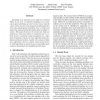Free Online Productivity Tools
i2Speak
i2Symbol
i2OCR
iTex2Img
iWeb2Print
iWeb2Shot
i2Type
iPdf2Split
iPdf2Merge
i2Bopomofo
i2Arabic
i2Style
i2Image
i2PDF
iLatex2Rtf
Sci2ools
DATE
2006
IEEE
2006
IEEE
Scheduling under resource constraints using dis-equations
Scheduling is an important step in high-level synthesis (HLS). In our tool, we perform scheduling in two steps: coarse-grain scheduling, in which we take into account the whole control structure of the program including imperfect loop nests, and fine-grain scheduling, where we refine each logical step using a detailed description of the available resources. This paper focuses on the second step. Tasks are modeled as reservation tables (or templates) and we express resource constraints using dis-equations (i.e., negations of equations). We give an exact algorithm based on a branch-and-bound method, coupled with variants of Dijkstra’s algorithm, which we compare with a greedy heuristic. Both algorithms are tested on pieces of scientific applications to demonstrate their suitability for HLS tools.
Related Content
| Added | 10 Jun 2010 |
| Updated | 10 Jun 2010 |
| Type | Conference |
| Year | 2006 |
| Where | DATE |
| Authors | Hadda Cherroun, Alain Darte, Paul Feautrier |
Comments (0)

